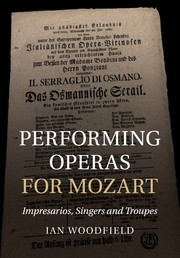Book contents
- Frontmatter
- Contents
- Illustrations
- Figures
- Tables
- Musical examples
- Abbreviations
- Introduction
- 1 Pasquale Bondini
- 2 Die Entführung aus dem Serail
- 3 The Italian troupe in Prague
- 4 The Prague Figaro
- 5 The genesis of Don Giovanni
- 6 The première of Don Giovanni
- 7 The casting of Don Giovanni
- 8 The Leipzig Don Giovanni
- 9 The 1788 Prague Don Giovanni
- 10 Mozart’s music in Leipzig
- 11 Josepha Duschek’s academy (22 April 1788)
- 12 Mozart’s academy (12 May 1789)
- 13 Guardasoni in Warsaw
- 14 The première of La clemenza di Tito
- 15 The Leipzig reception of the Da Ponte operas (1792–1794)
- 16 Guardasoni diversifies
- Conclusion
- Appendices
- Bibliography
- Index
- References
11 - Josepha Duschek’s academy (22 April 1788)
Published online by Cambridge University Press: 05 January 2012
- Frontmatter
- Contents
- Illustrations
- Figures
- Tables
- Musical examples
- Abbreviations
- Introduction
- 1 Pasquale Bondini
- 2 Die Entführung aus dem Serail
- 3 The Italian troupe in Prague
- 4 The Prague Figaro
- 5 The genesis of Don Giovanni
- 6 The première of Don Giovanni
- 7 The casting of Don Giovanni
- 8 The Leipzig Don Giovanni
- 9 The 1788 Prague Don Giovanni
- 10 Mozart’s music in Leipzig
- 11 Josepha Duschek’s academy (22 April 1788)
- 12 Mozart’s academy (12 May 1789)
- 13 Guardasoni in Warsaw
- 14 The première of La clemenza di Tito
- 15 The Leipzig reception of the Da Ponte operas (1792–1794)
- 16 Guardasoni diversifies
- Conclusion
- Appendices
- Bibliography
- Index
- References
Summary
Mozart’s music was also promoted in Leipzig by friends and acquaintances from Vienna and Prague who visited the city. In 1788, one of his most loyal supporters, Josepha Duschek, gave an academy in which she incorporated one of his concert scene. The performance on 22 April was part of an extended tour, the main focus of which was Dresden, where she was better appreciated than elsewhere in northern Europe. She had established herself as a valued visitor to the Saxon Court several years earlier during its spring season, when on 17 February 1785 she sang arias from Naumann’s operas Amphion and Cora to acclaim. The reviewer compared the voice of ‘this famous performer from Bohemia’ to that of the city’s leading opera singer, offering the opinion that ‘in beauty, strength and the silver tone of her singing, she surpasses Allegranti’, even if in other respects she was not a match for Hellmuth. From a Dresden critic this was high praise. Procházka cites an extended piece from the Prager Oberpostamtszeitung on 15 March 1785, in which the anonymous writer sought to rebut criticism that Josepha was not sufficiently valued in her home city. In his opinion, she could be compared to the nightingale, the rarity of whose song simply increased its value. The esteem that her musicality and modesty had won in Dresden were certainly now to be acknowledged. No one there had heard so powerful a voice, of such compass, firmness, flexibility and fluency. In 1800, the anonymous author of ‘Ueber den Zustand der Musik in Böhmen’, acknowledging that Duschek was still pre-eminent in her class, noted how her tours had contributed to her reputation. Despite not being Bohemian by birth, she was happily claimed as a compatriot by this nationalistic writer on the grounds both of her marriage and the general pleasure she had given in opera.
In the spring of 1786 Duschek was in Vienna, but in 1788 she returned to Dresden, where reports show no diminution of the critical enthusiasm: she performed in sacred concerts, in a Masonic event and in her own academy. Her appearances at the ‘Concerts Spirituels’ for the benefit of the poor were on 18 March and 8 April. On 7 April, she sang a Masonic piece by Naumann entitled ‘Freudenlied’ with a choir prepared by the lodge. At her own benefit concert on 17 April, she sang ‘2 Scenen von Mozart’ and an excerpt from Naumann’s Orpheus. The venue was the Hotel de Pologne, where many of the city’s prestigious spring academies were held. A few days later, on 22 April, Herr Hurka gave a concert at which he sang several scenes from Naumann’s Amphion and one from Orpheus, and there was a Mozart piano concerto: ‘Herr Himmel spielte ein Concert auf dem Forte piano von Mozart.’ This was not Mozart’s young pupil Johann Nepomuk Hummel, who performed in 1789, but a player from Halle, whose improvisatory skills had impressed the previous year. Another visiting musician who put on a concert there was Stamitz, whose performance on 16 April 1787 included ‘ein Concert auf der Bratsche’ and ‘eine Sonate auf der Viole damour’. A second venue known as Hassens (or Hessens) also hosted spring academies: on 24 March 1786 Therese Paradis performed a ‘Flügelconcert’ and sang several arias; in March 1789 Weichsel’s virtuosity on the violin dazzled the audience; and, less felicitously, in March 1785 a Neapolitan basset-horn player failed to make an impact.
- Type
- Chapter
- Information
- Performing Operas for MozartImpresarios, Singers and Troupes, pp. 136 - 147Publisher: Cambridge University PressPrint publication year: 2011



